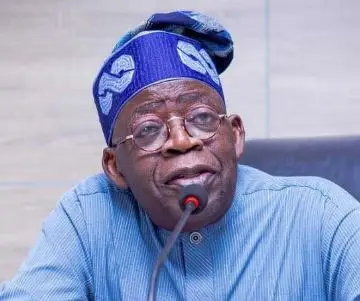Tinubu pledges commitment to transparent governance

During an interactive session with members of the National Council of Traditional Rulers of Nigeria (NCTRN), President Asiwaju Bola Tinubu conveyed his commitment to an open-door policy aimed at harnessing the country’s abundant resources for tangible progress.
The President emphasized the importance of active listening as a means to translate Nigeria’s vast potential into concrete reality.
In the session, Tinubu addressed various key areas of governance, outlining the government’s stance on significant issues. The President shared insights regarding the government’s decision on fuel subsidy, emphasizing the need for effective management and potential reforms in this area. Additionally, Tinubu highlighted the administration’s dedication to enhancing national security, prioritizing the creation of job opportunities, fostering an enabling business environment, and ensuring a transparent process for the election of National Assembly principal officers.
Through this interactive session, President Tinubu made it clear that his administration is dedicated to promoting openness and inclusivity in governance, recognizing the importance of engaging with stakeholders and listening to their perspectives. By addressing crucial topics and sharing the government’s stance, Tinubu demonstrated his commitment to transparent leadership and the advancement of Nigeria’s socio-economic landscape.
‘‘We are all ears. We are ready to listen at any given time. I promise you an open-door policy and that is the way I will go.
‘That open-door policy is for you to call me and send to me at any given time any concern that you might have.
‘‘We may not have it right 100 per cent of the time but we must get it right 90 per cent of the time for this country,’’ he said.
On the removal of fuel subsidy, the President appealed to the traditional leaders to persuade Nigerians to have faith and that the pump prices of fuel would eventually come down.
‘‘I am grateful that you are paying attention to what I have been doing. You have paid attention to the subsidy removal.
“Why should we in good heart and sense, feed smugglers and be Father Christmas to neighbouring countries?
‘‘The elephant that was going to bring Nigeria to its knees is the subsidy.
“A country that cannot pay salaries and we say we have potentials to encourage ourselves. I think we did the right thing,’’ he said.
Recognizing the concerns surrounding the lack of essential infrastructure across various regions of the country, Tinubu made a commitment to eliminate any obstacles hindering Nigeria’s progress.
‘‘The lamentations about the capital projects, where is the money going to come from if we don’t protect our resources and our boundaries?
‘‘You cannot have development without capital projects,’’ he added.
During his address to the Royal Fathers, President Tinubu emphasized the importance of harmonious relationships within the National Assembly’s leadership. He urged the esteemed traditional rulers to guide and counsel their subjects on the significance of managing their ambitions and fostering unity within the legislative house. Tinubu’s message conveyed his commitment to promoting a cooperative and productive environment among elected representatives.
The President further expressed his willingness to collaborate with any duly elected representative, emphasizing that the greater goal of advancing the Nigerian nation was his top priority. By making this statement, Tinubu demonstrated his readiness to work with individuals across different political affiliations, highlighting the importance of collective efforts in realizing the shared vision of progress and development for Nigeria.
On security, the President reiterated his pledge to prioritise the sector until Nigerians “go to sleep with their two eyes closed.’’
He said that the unity of the country could not be compromised, adding that every region of the country would get “what it is due.”
“We are going to tackle youth unemployment. It is only when we have prosperity for the country that we can create jobs that will employ our youths.’’
Tinubu expressed his dismay at the occurrence of crude oil theft in the Niger Delta region, specifically highlighting that this illegal activity was perpetrated by only a small fraction of the population. He emphasized that such actions were detrimental to the overall economy of the region and the nation as a whole.
“We need to tame those involved in this sabotage and we will work as hard as possible to ensure that the diversity of this country is used for its prosperity, growth and stability.’’
During his address to the traditional rulers, Tinubu conveyed his readiness to assume the responsibilities of governance, now that the campaigns and elections had concluded. He assured them that he was fully prepared to embark on the task at hand, acknowledging the importance of effective leadership and the fulfillment of promises made during the campaign period.
Regarding the electricity sector, the President highlighted a significant development. He informed the audience that a constitutional amendment, which had recently been enacted into law, granted each of Nigeria’s 36 states the authority to generate electricity. This amendment represented a notable step forward in empowering the states to actively participate in the production and distribution of electricity, potentially fostering greater efficiency and progress in the energy sector.
By expressing his preparedness for governance and sharing the positive legislative development concerning electricity generation, Tinubu demonstrated his commitment to effective leadership and addressing critical issues that impact the welfare and progress of the Nigerian people.
“That’s devolution of power and that should be our contribution to the developmental projects you are looking for and we will continue in ways that will help our people,’’ he said.
Expressing gratitude, Tinubu conveyed his appreciation to the members of the National Council of Traditional Rulers of Nigeria (NCTRN) for their timely visit and prayers, which were extended to ensure the success of his administration. The President acknowledged the importance of their support and recognized their significant role as custodians of tradition and culture in the country.
During the visit, the Chairman and Co-Chairman of the NCTRN, Sultan of Sokoto, Alhaji Muhammad Saad Abubakar, and Ooni of Ife, Oba Adeyeye Ogunwusi, respectively, pledged the unwavering support of their fellow members representing all six geopolitical zones of Nigeria. They reaffirmed their commitment to stand behind President Tinubu as he pursued his vision under the Renewed Hope agenda, vowing to continue offering their prayers for the advancement and progress of the nation.
The assurance of support and ongoing prayers from the NCTRN members, as conveyed by their esteemed leaders, demonstrated a collective commitment to working together for the betterment of Nigeria under President Tinubu’s leadership. Their pledge reflected the recognition of the vital role traditional rulers play in promoting unity, stability, and development within the country.
“We are 100 per cent in support of your government and we believe in the will of the Almighty Allah you will move this country forward.
“We will contribute our quota to the development of the country once you reach out to us,’’ the Sultan said.
During the interactive sessions, the Ooni of Ife expressed his satisfaction with the unity and resilience displayed by the country despite facing numerous challenges. He commended the Nigerian people for remaining united and focused during difficult times. Additionally, the Ooni urged President Tinubu to recognize the potential of traditional rulers and leverage their influence to complement the programs and visions of the new government. By involving traditional rulers, the President could tap into their wisdom and experience in driving positive change and progress.
The interactive sessions also included notable members of the National Council of Traditional Rulers of Nigeria (NCTRN) such as the Shehu of Borno, Alhaji Ibn Umar Al Amin El-kanemi, the Obi of Onitsha, Igwe Alfred Achebe, and the Emir of Kano, Alhaji Aminu Ado Bayero. Their presence at the sessions showcased the diversity and representation of traditional rulers from various regions of the country.
Furthermore, other esteemed members who participated in the sessions were the Amanayabo of Nembe, Edmund Daukoru, the Tor Tiv, Prof. James Ayatse, and the Deji of Akure, Oba Aladetoyinbo Aladelusi. Their inclusion underscored the significance of their roles as custodians of tradition and culture, representing their respective communities and contributing to the broader discussions on governance and national development.
The presence of these distinguished traditional rulers at the interactive sessions reflected their commitment to actively engage with the government and contribute their insights and perspectives towards the advancement of the nation.










